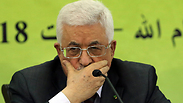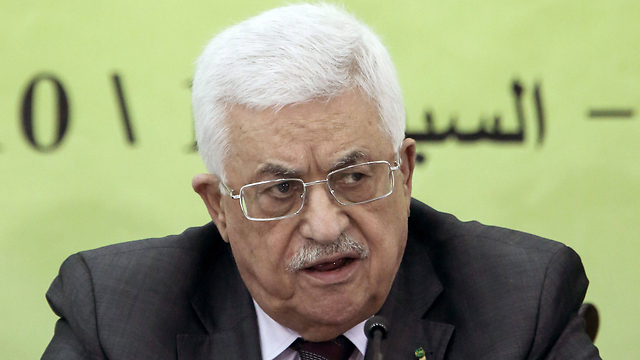
The futility of violence
Op-ed: Abbas once abhorred violence as self-defeating, but now backs the attacks in Jerusalem, Israel cannot be defined by a group of soccer hooligans, and Yigal Amir definitely did not achieve anything with his despicable murder of Rabin.
Amana Muna was sentenced to life imprisonment. She was part of a terror cell that in 2001 murdered Ofir Rahum, a 16-year-old high school student from Ashkelon. She lured him to a "romantic rendezvous." The other members of the cell shot and killed him.
Muna was released in the framework of the so-called Gilad Shalit deal. Shortly after her arrival in Turkey, Mahmoud Abbas went there to meet with her. Mohammed Daoud al-Akari, another killer released in the Shalit deal, is there in Turkey too. His brother, Ibrahim, was the individual who carried out the hit-and-run terror attack in Jerusalem this week.
Abbas has played a major role in toning down the violence in recent years. That same Abbas may now be changing his tune – his exaggerated demands in the negotiations with John Kerry, his increasingly extremist statements in recent weeks, his letter of condolences to the family of terrorist Muataz Hijazi (son of a Saudi family from the Hijaz region), who tried to assassinate Yehuda Glick.
Something may be changing. The hit-and-run attack in Jerusalem has the Palestinian leader's name written all over it. The voice is the voice of Abbas. The hands are the hands of Hamas. Pundits assess that he has no interest in the renewal of the violence. Of course not. The Palestinians can only come out losers. But since when, Goddamnit, do the Palestinians act only in keeping with their own interests?
* * *
The images were clear. Video footage was streamed from numerous angles. A crazy fan invaded the pitch and launched an assault on Maccabi Tel Aviv star Eran Zahavi. But look, almost all the reactions from the Hapoel fans included justifications, slurs against Zahavi and the like.
Soccer fans are not all violent hooligans; some are upstanding individuals. But they all vanished into thin air – because in an age of free-flowing information, in an age of live broadcasts, in an age in which the picture is crystal clear, integrity disappears too. Why was it so difficult to state in the clearest of ways: We love Hapoel, but violence doesn't have a place, and there's no justification for violence, and no ax to grind with Zahavi can excuse hooliganism on the field? Why is it so difficult?
It's not only in the soccer; it's in practically every field. Solidarity with the herd causes blindness. Does the left listen to the just (yes, there are some) arguments of the right? And does the right listen to the just (yes, there are some) arguments of the left? You've got to be joking. And no, it's not funny. It's sad.
Following the fiasco of the derby, the education minister said that Israel was suffering from a profound illness of violence. The president said the same three weeks earlier. Both men, and not only them, struggle to distinguish between violent phenomena and a sick and violent society. They are two different things. In practice, an inter-ministerial research team collects data from a series of entities, including the police, the education system, the Social Affairs Ministry, and support centers for victims of sexual assault. The result is the so-called Violence Index. This index is not based only on complaints, but also includes a survey, since many violent crimes are not reported at all.
So, let's see: Figures from the period 2004-2013 show a steady decline of around 1.2 percent a year in the number of violent incidents in the country. When compared with global data, Israel, in most areas, falls in line with the OECD average. In one area, violent assaults, Israel shows figures of seven incidents per 100,000 residents, compared to the OECD average of just three. As mentioned, however, the trend is declining. Education Ministry authorities confirm a similar trend – a decline in violent incidents in schools in recent years.
The president and education minister are entitled and even duty bound to speak out against violence. But before they turn Israeli society on the whole into a sick society, suffering no less from a "profound illness," would they kindly first check the figures, and would the education minister kindly review his own ministry's data. Yes, it has indeed become fashionable to speak of late about our "violent society." But the facts, one should recall, point in a different direction.
* * *
I wrote last week that Yitzhak Rabin's assassin, Yigal Amir, didn't triumph. I received angry responses. There appears to be a consensus, voiced in numerous articles, surrounding the notion that the assassin is to blame for the absence of peace in Israel. Is this indeed the case?
The thing is, the person responsible for tripping up the chances for peace was the man who rejected the Clinton proposal. His name is Yasser Arafat, not Yigal Amir. The individual who again undermined the prospects for peace was the man who rejected Olmert's proposal. His name is Mahmoud Abbas, not Yigal Amir. The person primarily responsible for flunking Kerry's draft proposal was, as I outlined in previous articles, Abbas, and not Yigal Amir.
The same is true of the violence. Amir won? Oh, come on. Back then, after all, a left-wing politician couldn't even enter the Mahane Yehuda or Carmel markets. The mood was much more violent. A fired-up mob attacked the car of Labor's Benjamin (Fuad) Ben-Eliezer in what was almost a lynching. The situation has changed – only for the better. Yes, there is violence; there are hooligans; they raised their heads this week again at the soccer derby – but less, much less.
Another urban legend in the same vein states that Amir influenced the election results. Well, in the months before the assassination, the Labor Party was in free fall in the polls because of the wave of terror ("the victims of peace") at the time.
The assassination did indeed have an effect on the election results, but in the opposite direction. The Labor Party regained the lead in the polls – and by a considerable margin. It didn't help. The terror continued after the murder too. And the decline in the polls began – not because of Amir, but because of the terror. And still, the polls predicted a Labor victory. But then Operation Grapes of Wrath against the nests of terror in Lebanon came along. An errant Israeli shell caused the death of 100 innocent civilians in Kafr Kana. The Arabs of Israel were outraged, and many of them, as a sign of protest, chose not to vote for Shimon Peres, who narrowly lost out to Benjamin Netanyahu.
These are the facts. Yet the mantra, "Yigal Amir halted the peace process" is aired repeatedly and constantly. Peace is important; but why this stubborn adherence to self-deception? Amir is a despicable murderer. He didn't achieve a thing. He didn't halt any process. He didn't affect a regime change. Thus, it's unclear why so many insist not only on rewriting history, but also on crediting the despicable murderer with honor and respect and achievements. He doesn't deserve it. We don't deserve it.











